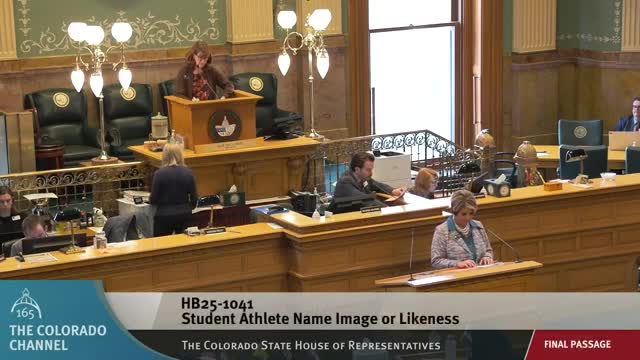House approves bill letting colleges sign name, image and likeness contracts amid transparency concerns
Get AI-powered insights, summaries, and transcripts
Subscribe
Summary
The House passed House Bill 10‑41 to allow colleges to contract with student athletes for their name, image and likeness (NIL). Supporters urged universities to adopt transparency and equity safeguards; debate focused on reporting, Title IX implications and sealing athlete contracts.
The House of Representatives on Feb. 18 approved House Bill 10‑41, a measure authorizing institutions of higher education in the state to enter into contracts with student athletes for use of their name, image and likeness (NIL). Supporters said the bill aims to clarify how colleges may permit and administer such contracts while urging universities to address transparency and equity concerns.
Assistant Majority Leader Bacon, who spoke at length during third‑reading debate, framed the bill as a response to the national shift that followed litigation recognizing athletes’ NIL rights. “The bill is about being able or supporting universities and being able to contract for name, image, likeness with student athletes,” Bacon said. He urged universities to develop reporting and policies so athletes can negotiate from an informed position and to guard against pay disparities that could raise Title IX concerns.
Debate on the floor flagged two central concerns: transparency and Title IX. Bacon noted a recent executive order the president signed saying that Title IX does not apply to some NIL arrangements and urged the university system to ensure equitable treatment and public reporting so students and the public can see who is compensated and how much. The bill requires universities to rely on aggregate NCAA reporting, but supporters and at least one sponsor said additional state‑level transparency would be prudent to monitor equity across sports and genders.
Supporters also raised governance questions about enterprise funds and auxiliary accounts at universities that handle NIL payments. Bacon and others said those accounts operate with limited publicly elected oversight, and that fully sealed athlete contracts could put students at an informational disadvantage when negotiating compensation.
The House approved the bill on third reading. The transcript records the final tally as 59 yes, 5 no and 1 excused. The majority leader moved the bill; the floor proceedings included multiple cosponsors.
What comes next: The bill will be enrolled and transmitted to the governor. Backers indicated they will press universities and university governing bodies to adopt transparency measures and monitoring to address equity and Title IX concerns raised during debate.
